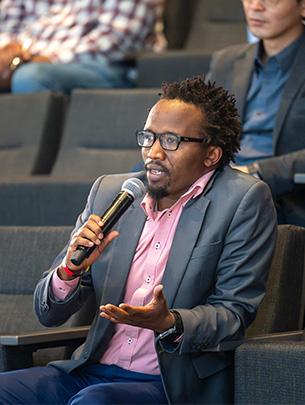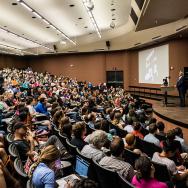The University of Chicago launched the Forum for Free Inquiry and Expression on Oct. 5, with President Paul Alivisatos opening the two-day event by underscoring its goal to serve as “a site for the genuine, never-ending struggle to be a place where free expression genuinely serves the seeking of truths, through listening as well as sharing our own ideas.”
The Chicago Forum builds upon UChicago’s historic commitment to free expression, providing a focal point for research and discussion in academia and in the broader culture. During the two-day launch event at the Rubenstein Forum, Faculty Director Tom Ginsburg and Executive Director Tony Banout joined experts and leading thinkers in the kinds of discussions that the Chicago Forum uniquely hopes to facilitate among members of the UChicago community and beyond—examining intersecting topics including the impact of technology, diversity and inclusion, and political polarization.
“For students, especially … expressing oneself does not come easily or automatically. It is not simply the absence of constraint which allows us to engage in deep expression,” said Ginsburg, the Leo Spitz Distinguished Service Professor of International Law. “Instead, the University really is required, in my view, to actively construct opportunities for interrogation of ideas and the exchange of views across difference.”
The role of higher education
Throughout the event, Alivisatos and other speakers reiterated the important role that universities play in upholding free expression.
“An openness to hearing that your own way of thinking isn’t quite right … is at the core of what a university truly is,” he said.

Conversations explored creating a university climate in which students, researchers and instructors feel invited to share their views, including the role of institutional neutrality.
“Universities and colleges do themselves a big favor when they remove taking a stance on political issues from the equation and instead say, ‘that’s for you all to do here at this University,’” said Alex Morey of the Foundation for Individual Rights and Expression (FIRE). “We’ve seen the problems that other paths have caused, and we think it will encourage free discussion when faculty know that their research isn’t going to make their president angry.”
Prof. Jeffrey Flier of Harvard University discussed the importance of asserting institutional values when necessary without curtailing a culture of free speech.
“We have institutional values,” said Flier, “but we’re not going to draw them in this fashion so that we chill the ability and inclination of our faculty to speak out on important issues.”
Free expression, diversity and inclusion
Many of the discussions included reflections on the complex intersections between free expression and issues of diversity and inclusion.
Tracie Hall, executive director of the American Library Association, noted the role of free expression, libraries, and access to information in building social activist movements and defending minoritized groups.
Hall highlighted a quote from an 1867 issue of Harper’s Monthly—“The alphabet is an abolitionist”—which emphasized the role of literacy and information access in the fight against slavery. She also stated that libraries and librarians were historically “at the forefront of the conversation about LGBTQ+ visibility” and remain so today.
“An openness to hearing that your own way of thinking isn’t quite right … is at the core of what a university truly is.”
For Hall, these examples illustrate the way in which intellectual freedom and diversity, equity and inclusion serve as “mutually reinforcing principles.” “If they are not,” Hall said, “we are doing both wrong.”
Discussions also addressed challenges in maintaining free expression on campuses that continue to grapple with discrimination and inequality.
Mary Dana Hinton, president of Hollins University in Virginia, said: “Intellectually, I absolutely understand that education demands free inquiry and expression,” she said. “But life is so much more complicated than that.”
Peel away the theory, and it’s a much more complex topic, she said.
Photo gallery 1/6
“My experience as a Black woman who grew up in the rural South with limited resources and who is now the president of a university in southwest Virginia—I’m acutely aware of the deep controls of the freedoms that I’m allowed to experience and express,” Hinton said. She pointed out that free expression and free inquiry exact “different tolls on different groups of people. Traditionally marginalized groups often pay a much higher price for freedom of expression.”
UChicago Prof. Cathy Cohen noted the challenges she has faced as a Black woman throughout her career, but said “free speech is an instrument.”
“I have been in multiple situations in educational scenarios or classrooms where, in fact, I have been demeaned and Black people have been demeaned, where there has been harmful speech,” said Cohen, the David and Mary Winton Green Distinguished Service Professor. “I think part of what I would ask us to do is to say we want to pursue free speech, but to be serious about the complicated nature and the issues that surround the anchoring of free speech.”
Nadine Strossen, an activist and past president of the ACLU, said freedom of speech should be a “shared reality” for everyone. That includes resources for everyone, she said.
“Traditionally marginalized groups often pay a much higher price for freedom of expression.”
“I completely understand that freedom of speech is a double-edged sword,” she said. “I defend freedom, for example, for hate speech, not despite the fact that it clearly can have an intimidating and chilling impact on other people’s speech, but because I think the alternative of centralized suppression is worse, especially for those groups that have traditionally been marginalized and disempowered.”
Political polarization and the media landscape
Discussions also focused on the changing relationships between new technologies and today’s political conversations.

Renowned philosopher Joshua Cohen of the University of California, Berkeley, focused on tensions between democracy, free speech and promoting truth in public discourse, noting that new platforms have “expanded the aperture of participation in public discussion.”
Cohen observed: “The challenge that we face is to capture the benefits of this expanded aperture in a way that doesn’t undermine the fundamental quality of public discussion and that is consistent with democratic values.”
Subsequent discussions also emphasized the challenges of communicating openly and reaching across partisan divides in a polarized political and media landscape.
Former Democratic Senator Heidi Heitkamp, director of UChicago’s Institute of Politics, and former Republican Senator Richard Burr discussed how sensitivity to social media and news coverage has altered incentives for politicians.
Heitkamp noted that the current media landscape’s emphasis on stoking identities has hindered the ability of politicians to communicate openly and draw on common understandings about policies. “We’ve got to start making knowledge a community goal,” said Heitkamp. “The real problem that keeps me up at night is that we no longer see a collective value in growing knowledge.”
Launch events 'a beginning, not an end'
The discussions were just the start of the Chicago Forum’s work to promote the understanding, practice, and advancement of free expression at UChicago and beyond.
Throughout the academic year, its inaugural programs will include the Zell Series of lectures and events, fellowships and student grants, upcoming arts programming with Doc Films and the Logan Center, and more. Banout also emphasized the range and societal impact of the Chicago Forum’s current and future partnerships, noting its plans to collaborate with students, scholars, business leaders, arts organizations and other institutions.
Alivisatos concluded the two-day launch events on Oct. 6 by emphasizing the need for continued, open discussion on the best ways that universities can promote a culture of free expression.
“I hope that you will view this event as a first experiment,” Alivisatos said, “as a beginning, not an end, and that you will see the Forum as the place for a constant struggle to get this right.”
Learn more at the Chicago Forum website.

















